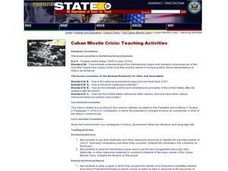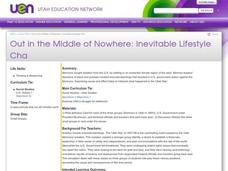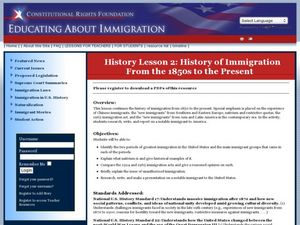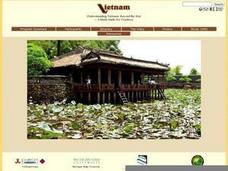Curated OER
The failure of Diplomacy, September-December 1941
Students investigate four main issues of concern between US and Japan prior to US involvement in World War II. In this role play lesson, students will take the role of US and Japanese negotiators trying to find a diplomatic solution to...
Curated OER
Opposing Views on the Vietnam War
High schoolers consider opinions regarding the Vietnam War. In this Vietnam lesson, students compare Nixon and Johnson's policies about the war. High schoolers also research the anti-war movements as well as the sentiments of the those...
Curated OER
Acting Legally
Students analyze potential challenges that immigrant women have in the workforce. In this history lesson, students identify specific problems immigrant women face, then brainstorm possible solutions in their group. The final assignment...
Curated OER
Marching For Freedom
Students appreciate the sacrifices that people from across the country made to ensure that all citizens could exercise their constitutional right to vote. They access excellent websites and documents imbedded in this plan to guide their...
Curated OER
Cuban Missile Crisis: Teaching Activities
Learners create a timeline of the important events of John F. Kennedy's presidency. They construct a timeline of the major events of the Cuban Missile Crisis. They compare the Missile Crisis events with their presentation in the movie...
Curated OER
Paying With Their Health
Students consider the plight of immigrant workers. In this undocumented immigrant lesson, students compare the worker of the Industrialization era to the undocumented immigrant workers of today. Students read and discuss literature about...
Curated OER
Out in the Middle of Nowhere: Inevitable Lifestyle Changes
Eleventh graders examine the interaction between Utah's geography and its inhabitants. They explain how looking at cause/effect relationships is an example of historical thinking.
Curated OER
How Man Negotiates Away His Natural Freedom
Young scholars recognize that our legal-political system has developed through a process of moving from philosophical ideals to compromised working models.
Curated OER
CIVIL DISOBEDIENCE
Young scholars use events of the time to illustrate the significance of the 1965 Selma-to-Montgomery Voting Rights March.
Curated OER
Change: Just a Matter of Time
Students analyze the Declaration of Independence and primary sources to explain civil rights. Then, students write a Declaration of Change to express the grievances of African Americans, and their desire to participate fully in the...
Curated OER
Ancient Greece: The Olympics and the Gods
Research Ancient Greece, the Olympic games, and Greek mythology. Young historians will research Ancient Greece and complete multiple activities about the history and culture. This is a unit of lessons.
Curated OER
Sparta and Athens
Sixth graders study Ancient Greece. In this Ancient Greece lesson, 6th graders complete 16 lessons to learn about Ancient Greece. Students complete a quiz for assessment.
Curated OER
Population Diversity And Human Rights
Students explore the concept of economic sanctions. In this population diversity and human rights lesson, students examine how the United States uses economic sanctions to support or prohibit international activities. Students present...
Curated OER
Presidents of the United States
Young scholars discuss American Presidents. They each complete research on one particular President and then, using a template, create a short biography (including a picture) about him. When all biographies are complete, they compile...
Curated OER
Black Hawk Island Hike
Students explore Wisconsin's natural and cultural history through hands-on exploration of Upham Woods. They are shown the basic paddling skills and they work in teams to paddle across the river on barge. Students describe cultural...
Curated OER
History of Immigration From the 1850's to the Present
Eleventh graders study the history of immigration from 1850 to the present. In this American History instructional activity, 11th graders compare the 1924 and 1965 immigration acts and give a reasoned opinion on each. Students...
Curated OER
Victory in the Pacific
Students explore the overall Allied strategy in the Pacific from 1943-1945 and assess its effectiveness. They explore the reasons why the atomic bomb was used and why use of that weapon was controversial.
Curated OER
The Taxpayer's Rights
Students examine rights of taxpayers and procedures the IRS uses to process tax returns
Curated OER
Defusing School Violence
Students practice problem-solving skills as they listen to a scenario in which students defuse violence and tension at their own school. In this defusing school violence lesson, students discuss hate-based violence and brainstorm ways to...
Curated OER
A Brief History of Vietnam (1858-2004) and Its Evolving Communist System
Students examine the French colonization of Vietnam, the Vietnam War, and the current evolving Communist system. They develop political maps, outline the major events of the Vietnam War, write an essay, and compare/contrast democracy...
Curated OER
Comparison of Colonial Regions in British North America
Students compare and contrast the colonies in British North America. As a class, they brainstorm a list of people, places and ideas associated with the Colonial Era. They discover the relationships and interactions between the...
Curated OER
Hate Crimes Legislation
Students investigate hate crime legislation. In this hate crime lesson, students examine the Matthew Shepard and James Byrd, Jr. Hate Crimes Prevention Act Students explore the fine between hate crime legislation and First Amendment...
Curated OER
Loss of Wetlands: Subsidence
Students observe subsidence and the effect it has on wetlands with a classroom demonstration. They think about the impact of global warming and the sea level and how it affects the marsh.
Curated OER
Lesson 2: How Taxes Evolve
Twelfth graders examine the legislative process of enacting federal income tax laws. They conduct research and report on the Federal Migratory Waterfowl Stamp (Duck Stamp) Act of 1934.

























